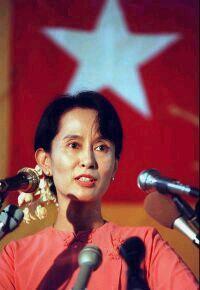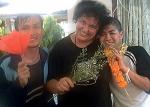Aung San Suu Kyi

In August of 2002, next door to a restaurant in the small village of Taunggy, Burma, I struck up a conversation with a young university student who was tending a small bookstore. “Can everyone speak (out) in America,” he asked. “Yes, we can,” I said, thinking I will not tell him about “politically correct” speech. He nodded sadly.
A few people, forbidden to talk about politics with foreigners, tried oblique approaches to the subject. One man with delicious donuts on a platter came up to me at the market and said to me in perfect English that he used to be an English teacher. Then he disappeared and returned a few minutes later with his wife who wanted to meet me. “She wants to go to America-so bad,” he said. I made several attempts to ask him to have tea and then dinner with us but was disappointed when he looked furtively around him and told me he couldn’t do that. The government has forbidden the people to talk to foreigners about politics but they are afraid to be seen talking to you (a foreigner) at all as it could mean trouble for them.
However, in Bagan our hired tour guide for a day to view the pagodas, told me that some Americans once told him that that there was a lot of fighting in Burma but that he reassured them there was no fighting in his country. I bit my tongue thinking of the BBC special the night before on satellite TV (that few in Burma can afford). It described the fighting between the ethnic minorities and the military near the Thai border where camps harbored thousands of refugees. American and European doctors regularly cross the border under cover of fire to care for the Karen and Shan tribal people who are suffering from a government policy of ethnic cleansing by burning their villages and killing the people outright or overworking them to death in forced labor groups. I’ll bet he is a government informer,” I said to Bob. “I think so too,” Bob said.
I have been watching the efforts of the international community to free Aung San Suu Kyi, the freely elected leader who has been under house arrest for 4 years and now for a 5th.
Suu Kyi’s Freedom Struggle
The Boston Globe
Published: May 21, 2007
“There are some historical figures who define an epoch because they embody its highest values. Nelson Mandela is one such figure. Vaclav Havel is another. Their sister in resoluteness is Myanmar’s Nobel Peace Prize laureate Aung San Suu Kyi, who has been incarcerated for most of the past 17 years by the brutal military dictatorship that rules her country.
Her National League for Democracy won more than 80 percent of parliamentary seats in a 1990 election that the junta has refused to honor. Because of her commitment to a dialogue with the generals that could lead to a democratic transition, she has become a living symbol of the democratic principle. Being devoted to nonviolence, she belongs to the same small band of peaceful liberators as Mahatma Gandhi and Martin Luther King Jr.
The junta will decide later this month whether to prolong Suu Kyi’s house arrest for another year. In response, there have been stirring calls for her release: 59 former heads of state, among them former presidents Jimmy Carter, George H. W. Bush, and Bill Clinton, signed a letter to junta leader Than Shwe, asking him “to release all political prisoners immediately and unconditionally, including National League for Democracy leaders Aung San Suu Kyi and U Tin Oo.”
Tellingly, the letter was signed by former prime ministers and presidents in Asia, where there has long been a reluctance to meddle in neighbors’ affairs.
To its credit, the White House issued a strong statement along with notification that President George W. Bush intends to renew sanctions on the junta that were first applied in the Clinton administration. While urging the release of Suu Kyi and all political prisoners, the White House noted that “the junta is becoming only more brutal, more repressive, and more indifferent to the concerns of its neighbors and the international community.”
An equally strong denunciation was contained in a Senate resolution for another year’s extension of import sanctions on the regime.
The senators decried the 1,300 political prisoners, the 70,000 forcibly recruited child soldiers and the junta’s use of forced labor, “human trafficking and rape used as an instrument of war.”
Sanctions are not effective everywhere, but lifting Myanmar sanctions would only strengthen the junta without helping the population. People of good will must hold fast in support of Suu Kyi and the democrats of Myanmar, as they once did in the struggles against apartheid, colonialism, and totalitarianism.”
Tags: Burma, Burma (Myanmar), Human Rights, Myanmar, World Watching And Politics


Leave a Reply